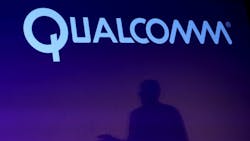Qualcomm to Gain Fees from China's Meizu in Lawsuit Settlement
Qualcomm Inc. (IW 500/45) said China’s Meizu Technology Co. has agreed to pay licensing fees to settle legal battles in China and three other countries, demonstrating the U.S. company can defend its intellectual property in the world’s biggest smartphone market.
Meizu will pay Qualcomm patent fees similar to those accepted by other Chinese phone makers, the two companies said Friday in a statement. In a test of its ability to appeal to Chinese courts, Qualcomm sued Meizu in June in China and other countries where Meizu was attempting to do business. The deal also ends those patent conflicts in Germany, France and the U.S., the companies said.
The legal dispute, ended by Friday’s agreement, was the first time that Qualcomm had asked Chinese authorities to enforce the terms of a settlement that resolved an antitrust investigation and let the San Diego-based company charge for its intellectual property. The U.S. company gets the majority of its profit from technology licensing.
In February 2015, Qualcomm announced it had paid $975 million to settle a case brought by China’s National Development and Reform Commission accusing the company of abusing its dominant position in the chip market for mobile phones. The agreement also set the terms for licensing fees that many Chinese companies hadn’t been paying at that time. The deal with the government let Qualcomm, after what it described often as “tough” negotiations, sign licensing agreements with most of China’s major phone makers.
Continuing success in court and negotiations is essential if Qualcomm is to defend a business unique in the chip industry. While sales of semiconductors provide the bulk of the company’s revenue, technology licensing generated 75% of its pretax profit in the 2016 fiscal year.
This week, South Korea’s antitrust regulator slapped a record 1.03 trillion won (US$853 million) fine on Qualcomm for violating antitrust laws. That decision, which Qualcomm is appealing, is part of a string of investigations the company is facing including in the U.S., Europe and Taiwan.
By Ian King
About the Author
Bloomberg
Licensed content from Bloomberg, copyright 2016.
